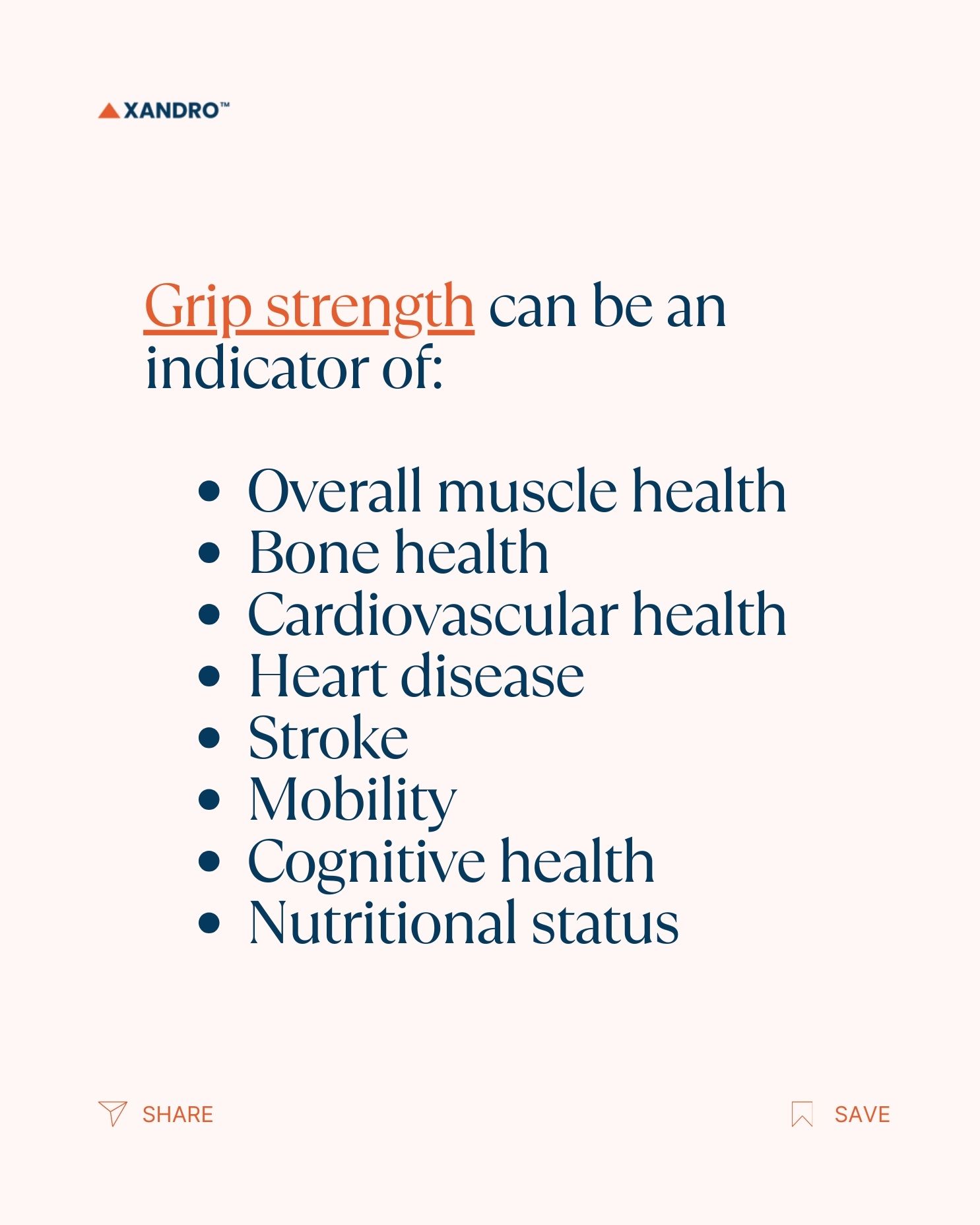Grip Strength & Longevity: Why It Matters for Your Health
18th Jan 2025
Grip Strength and Longevity: What You Need to Know for Better Health as You Age
As we age, maintaining strength becomes more than just a matter of staying active; it’s a predictor of how well we’ll age.
Grip strength, the force you can exert when squeezing something with your hand, has been found to be a simple yet powerful indicator of overall health and longevity.
Here’s what you need to know about grip strength and why grip strength is important for healthy ageing.
Jump there now:
- Why Is Grip Strength Important for Longevity?
- What Does Grip Strength Indicate About Your Health?
- Does Grip Strength Increase Longevity?
- How to Measure Grip Strength
- Exercises to Improve Grip Strength
- Addressing Grip Strength Frailty
Research shows a strong link between grip strength and longevity. Lack of grip strength is linked to higher risks of frailty, falls, bone fractures, cognitive decline, cardiovascular issues and even early death.
But why? Grip strength reflects your overall muscle health, which is important for maintaining mobility, independence and resilience against illness as you age.
- Frailty and Mortality Risks: A meta-analysis involving over 50,000 participants found that weak grip strength was associated with a 67 per cent higher risk of premature death.
- Cardiovascular Health: A 2015 study found that for every 5kg decrease in grip strength, the risk of cardiovascular death increased by 17 per cent.
- Heart Disease and Stroke: A study found that for every 5kg increase in hand grip strength, the risk of heart disease and stroke can be reduced by 8.1 per cent.
- Daily Functionality: Older adults with weak grip strength are more likely to struggle with basic tasks like carrying groceries or opening jars, reducing their quality of life.

Further Reading: Muscles and Longevity
More than just a measure of hand strength, grip strength can also be an indicator of health:
- Overall Muscle Health: A strong grip often correlates with better muscle strength throughout the body.
- Bone Health: Strong muscles support stronger bones, reducing the risk of osteoporosis and fractures. Studies have shown that higher handgrip strength is linked with less future fracture risk.
- Mobility and Independence: Weak grip strength is often linked to slower walking speed and difficulty with activities like rising from a chair.
- Cognitive Health: One study suggests that low handgrip strength was associated with a 28 per cent greater risk of mild cognitive impairment and a 34 per cent greater risk of persistent mild cognitive impairment.This includes the grip strength and dementia link, with a weak grip strength linked to a higher risk of dementia.
- Nutritional Status: Weak grip strength can signal malnutrition, especially in older adults.

While grip strength itself doesn’t directly increase lifespan, it can be used as an important marker of your overall health.
The correlation between grip strength and longevity lies in its connection to muscle quality, bone density and overall resilience. Weak grip strength may suggest increased risks of falls, fractures and functional decline, all of which contribute to shorter life spans and reduced independence.
Addressing the factors that contribute to weak grip strength — such as inactivity, poor nutrition or chronic illness — can significantly improve your quality of life and potentially your longevity.
Grip strength is typically measured using a hand-grip dynamometer, a device that you squeeze as hard as possible. It provides a simple, reliable score to evaluate your strength.
Hand grip strength normal range:
- For men: 28.5kg or higher
- For women: 18.5kg or higher
A meta-analysis of data from over 100 observational studies representing nearly 2.5 million adults aged 20 to 100+ from 69 countries and regions found hand grip strength peaked between 30 to 39 years.
It found that hand grip strength declined every decade by about 2.8kg for males and 1.4kg for females.
Lower scores can indicate potential health concerns, but improving grip strength is possible at any age.
Further Reading: All About Longevity
Improving your grip strength can be simple and effective with the right exercises.
Here are a few to try:
- Hand Squeezes: Use a stress ball or grip trainer to build strength. You can also squeeze a tennis ball as hard as you can for 5 seconds and note the effort.
- Farmer’s Carries: Hold heavy objects in each hand and walk a short distance. Start with 25 per cent of your body weight in each hand.
- Dead Hangs: Hang from a pull-up bar for 20–30 seconds to strengthen your grip and forearm muscles.
- Pinch Grips: Pinch and hold weight plates or other flat, heavy objects for 10–15 seconds.
- Wrist Curls: Strengthen your forearms by curling light weights with your wrists. Aim for 2–3 sets of 12 repetitions.
Consistency is key! Aim for grip strength exercises 2–3 times per week.
Further Reading: How to Live Longer with Anti-Ageing Exercises
If your grip strength is below the recommended range, it’s important to act. Weak grip strength, especially in older adults, can suggest underlying health issues like:
- Frailty: Difficulty performing daily activities.
- Nutritional Deficiencies: Inadequate protein or calorie intake. Studies suggest that consuming 1.2–1.6g of protein per kg of body weight daily can help maintain muscle mass.
- Chronic Illnesses: Conditions like diabetes or cardiovascular disease can weaken muscles.
Talk to your doctor if you’re concerned about weak grip strength. A tailored exercise plan, combined with proper nutrition, can make a significant difference.
Further Reading: Protein and Longevity
End Note
Grip strength isn’t just about a firm handshake; it’s a window into your overall health and a powerful predictor of how well you’ll age. Whether you’re managing your current health or looking to prevent future issues, improving your grip strength can be a simple yet effective step toward better ageing.
While grip strength exercises are important, don’t neglect overall body strength. Resistance training, proper nutrition and enough sleep all contribute to maintaining muscle mass and reducing frailty as you age. Even 10 minutes of daily physical activity can make a big difference.
Start small, stay consistent and remember that building strength — even in your hands — can lead to lasting benefits for your body and mind. A stronger grip could mean a stronger, healthier life.
If you’re looking to improve your muscle performance, consider the benefits of Calcium AKG in boosting bone mass, bone health and wound healing. If you’re dealing with inflammation in your hands that impedes your grip strength, you might also want to look into BCM® Turmeric Curcumin!
You can learn more about them on our research page!
Xandro. Science-First. Trusted Longevity Solutions.
